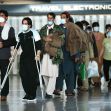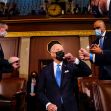On February 4, 2021, President Biden signed an Executive Order to address two specific categories of the United States Refugee Admission Program (USRAP): individuals applying under the Special Immigrant Visas for Iraqi and Afghan Allies program and future applicants becoming refugees because of climate change.
President Biden aims to ensure the program “provides a beacon of hope for persecuted people around the world,” while also working to “facilitate[] international collaboration to address the global refugee crisis.” The actions directed under the Executive Order are to ensure that USRAP is “rebuilt and expanded, commensurate with global needs.” As of 2020, the U.S. Refugee Act of 1980 has let more than 3.1 million refugees lawfully enter the United States under Section 207 of the Immigration and Nationality Act (INA).
In a proactive step, the Biden administration is beginning the discussion on accepting refugees forced to flee their home countries because of the effects of climate change. Within 180 days, departments within the federal government are to prepare a report on the impact climate change will have on migrants, both current and future ones. The report must also discuss international security implications, strategies for resettlement, and mechanisms for identifying bona fide applicants.
President Biden’s order revokes three of President Trump’s actions, including Executive Order 13815 “Resuming the United States Refugee Admissions Program with Enhanced Vetting Capabilities,” Executive Order 13888 “Enhancing State and Local Involvement in Refugee Resettlement,” and a March 2017 Memorandum entitled “Implementing Immediate Heightened Screening and Vetting of Applicants for Visas and Other Immigration Benefits, Ensuring Enforcement of all Laws for Entry into the United States, and Increasing Transparency among Departments and Agencies of the Federal Government and for the American People.
To address the previous administration’s concern and focus on vetting, this new Executive Order mandates the Department of State, Department of Homeland Security, and the Department of Defense to review current vetting procedures under USRAP and to provide recommendations on how to improve the system both in its efficacy and efficiency while ensuring applicants receive a fair chance for their applications to be reviewed.
While the Executive Order was touted as looking out for future refugees as a result of climate change, the majority of the order discussed revamping and revitalizing the program for Afghanis and Iraqis who assist as translators for the U.S. government or military and qualify for Special Immigrant Visas (SIVs). The Biden administration instructs both the departments of State and Homeland Security to review the current status of the program and report on any undue delays, compliance with eligibility requirements, a plan to provide training and oversight, and an assessment on how the two agencies will reconsider and reopen applications closed as a result of the previous administration’s stringent regulations. Additionally, the two departments will analyze whether additional populations should be considered for SIVs.
Both the Department of State and Department of Homeland Security are to consider how to expand adjudication capacity, including increasing hiring. Additionally, the Office of Personnel Management is ordered to support this increased hiring by expanding the use of direct hiring authority for these positions. This is a stark contrast to the previous administration’s actions toward the Department of Homeland Security, which almost furloughed 75% of its workers during the COVID-19 pandemic.
According to INA, a refugee is defined as a foreign individual who “has experienced past persecution or has a well-founded fear of persecution on account of race, religion, nationality, membership in a particular social group, or political opinion.” This definition comes almost directly from the United Nation’s 1951 Convention relating to the Status of Refugees.
In 2018, the United Nations addressed the impact “environmental degradation and natural disasters increasingly interact with the drivers of refugee movements.” However, the term “climate refugee” still has not been incorporated into the official definition of refugee on either a country or an international level.
The United Nations has noted that climate change, while it can lead to life-altering impacts on one’s home, the impacts typically lead an individual to be internally displaced before they find a need to cross national borders. In most circumstances, to fully be regarded as a refugee, the UN asserts that climate impacts had to be as a result of a man-made problem to a specified group of people, like a governmental policy resulting in artificial food shortages
Just days after this Executive Order was signed, the Biden administration signaled its desire to let more refugees into the country by quadrupling the admittance rate allowed under the Trump administration. The Biden administration is currently working with Congress to amend the ceiling on total refugee admissions.






